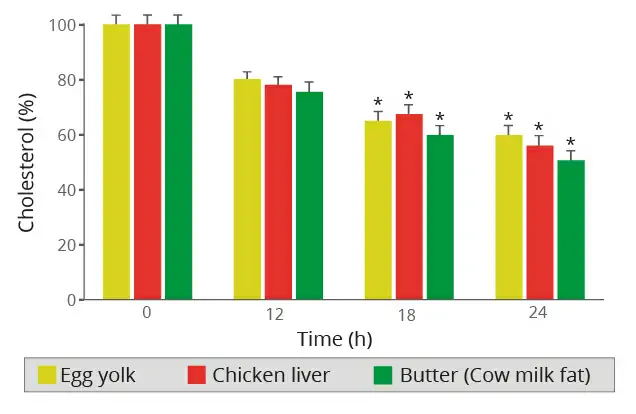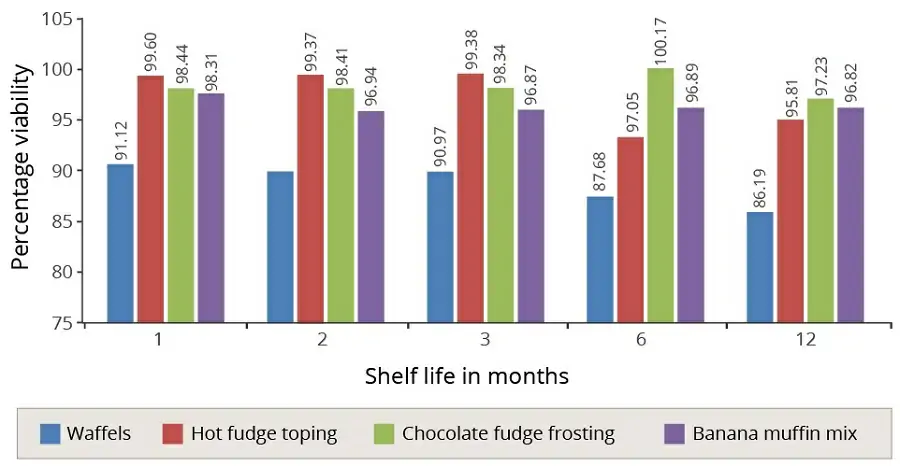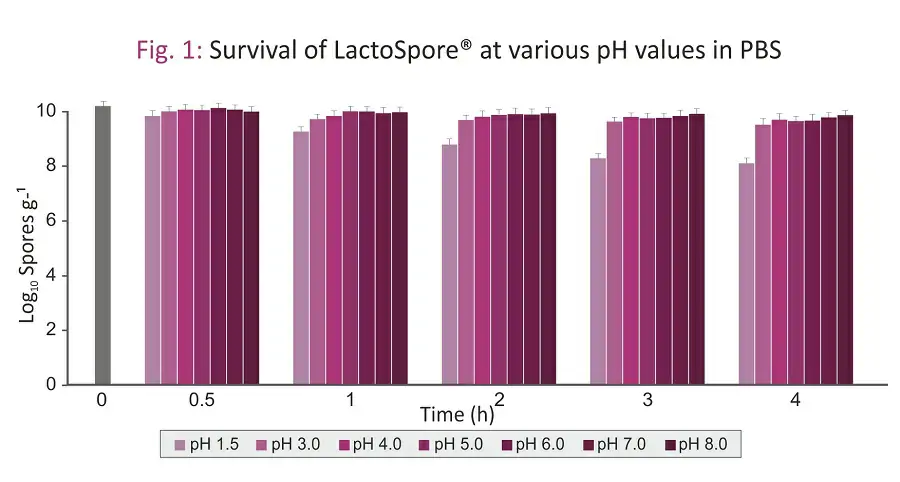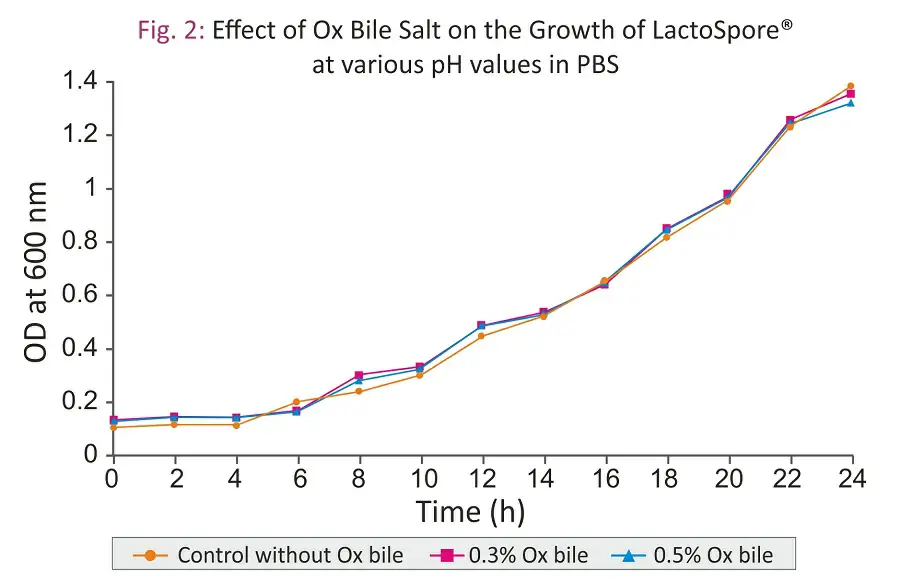Evaluation of the in vitro cholesterol-lowering activity of the probiotic strain Bacillus coagulans MTCC 5856
Read moreInt J Food Sci Tech. 2019;54(1):212-20
Cholesterol lowering is an important aspect to reduce the risk of cardiovascular complications, and various strategies have been evolved to reduce the blood cholesterol level. Sufficient scientific evidence suggests the positive impact of some probiotic organisms on cholesterol metabolism, leading to lower blood cholesterol levels. While the exact mechanisms by which probiotics lower cholesterol are unclear, it is speculated that bile salt hydrolase (BSHs) in the probiotics and/or their inherent ability to scavenge cholesterol could underlie this desired activity. |
Objective
To evaluate the in vitro cholesterol-lowering activity of the probiotic strain Bacillus coagulans MTCC 5856.
Study Design
- A plate assay method for Bile salt hydrolase (BSH) activity was performed by culturing the Bacillus coagulans on the media containing bile salts
- The cholesterol metabolizing ability of the bacteria was also assessed by growing the bacteria in a culture media supplemented with cholesterol and assessing the remaining cholesterol after 24 h
Results
- B. coagulans MTCC 5856 significantly (P < 0.05) reduced cholesterol levels in culture media under growing (48.42%), resting (live but suspended in buffer, 36.47%) and even heat-killed (dead, 8.5%) conditions
- B. coagulans MTCC 5856 significantly reduced the cholesterol levels in cholesterol-rich foods, such as egg yolk (39.79%), chicken liver (45.44%) and butter (49.51%), when incubated for 24 h in conditions mimicking the in vivo environment
- Bacillus coagulans MTCC 5856 also produced significant (P < 0.05) amounts of propionic acid and butyric acid while fermenting cholesterol-rich foods

BSH activity of Bacillus coagulans MTCC 5856. (a) Determination using soft MRS agar supplemented with ox bile (0.3%, w/v) and CaCO3 (0.3%, w/v). (b) Lactobacillus casei ATCC 393 was used as a positive control, and MRS agar without bile salts served as the negative control (c) Hollow zones suggest the BSH activity of B. coagulans MTCC 5856. Measurements were repeated three times (n = 3)

Effects of Bacillus coagulans MTCC 5856 on the removal of cholesterol from different food sources (egg yolk, chicken liver and butter)
For information: https://doi.org/10.1111/ijfs.13926Evaluation of probiotic Bacillus coagulans MTCC 5856 viability after tea and coffee brewing and its growth in GIT hostile environment
Read moreInt J Food Sci Tech. 2019;54(1):212-20
In recent years, probiotic functional foods have gained quite a popularity and become a preferred choice among consumers, due to their positive effects on the gut microbiota and overall health. However, their stability during the preparatory process of the functional food is a very important parameter to be assessed, since viability is foremost factor which influences colonization of the probiotic in the intestine and thus proposed health benefits. Coffee and tea are two important conventional drinks where probiotics can be combined with to form a probiotic functional product. |
Objective
To investigate the stability of Bacillus coagulans MTCC 5856 spore during the tea and coffee brewing process and to evaluate the ability of the probiotic to grow in gastrointestinal tract (GIT) hostile environment.
Study Design
- B. coagulans MTCC 5856 spores (15 × 109 CFU/g) powder (3.5 g) was added to the ground unroasted green coffee (96.5 g) or roasted coffee (96.5 g) and then blended at room temperature using blender
- The prepared blends were brewed to prepare coffee and tea
- The viable count was analyzed by plating the bacterial isolate of the product on glucose yeast extract agar by pour plate method
- The effect of gastric stress on the B. coagulans MTCC 5856 spores was studied in an in vitro experiment by mimicking the conditions of in-vivo
Results
- B. coagulans MTCC 5856 showed remarkable survival against the brewing conditions and was able to grow in GIT hostile conditions using tea and coffee as a sole nutritional source
- B. coagulans MTCC 5856 inclusion in tea and coffee after brewing did not significantly (P > .05) alter the sensory profile when compared to that without the probiotic inclusion
- B. coagulans MTCC 5856 growth was significantly (P < .05) higher when water soluble fibers were added during brewing, suggesting a synergistic property. It showed over 99% viability (P > .05) in tea and coffee powder at room temperature up to 24 months of storage.
Conclusion
This study demonstrated the stability of the tested probiotic strain B. coagulans MTCC 5856 against tea and coffee brewing condition and its growth in GIT hostile environment, thereby suggesting functional probiotic use in tea and coffee.
For information: https://doi.org/10.1016/j.foodres.2018.12.003Galactomannan from Trigonella foenum-graecum L. seed: Prebiotic application and its fermentation by the probiotic Bacillus coagulans strain MTCC 5856
Read moreFood Sci Nutr. 2018;6(3):666‐673.
Dietary fibers have been lauded and accepted for their useful implications in various human ailments. Most of the dietary fibers cannot be utilized by humans since we lack the enzymes needed to digest them. On the other side, these dietary fibers can be utilized by microorganisms as their energy source. Thus, these dietary fibers can form favorable food substrate for the probiotics. However, their assessment as a prebiotic is essential and also important for the development of an improved synbiotic commercial preparation. |
Objective
To evaluate the potential of galactomannan extracted from fenugreek seeds as a prebiotic fiber and also its fermentation by the probiotic strain Bacillus coagulans MTCC 5856.
Study Design
- Non-digestibility by the gastric acid and pancreatic enzyme hydrolysis of galactomannan were determined using an in vitro model simulating the human intestinal and gastric conditions
- Anaerobic fermentation and utilization of galactomannan by the B. coagulans MTCC 5856 was investigated followed by selective inhibition of Escherichia coli ATCC 25922
Results
- The galactomannan from fenugreek seeds was found to be nondigestible to gastric acid and pancreatic enzymatic hydrolysis
- The galactomannan was fermented and utilized (71.4%) by the B. coagulans MTCC 5856, and also significant amount of short-chain fatty acids production was observed
- B. coagulans MTCC 5856 inhibited the E. coli ATCC 25922 growth when co-cultured with galactomannan suggesting competitive fermentation of probiotic bacteria
- Galactomannan exhibited prebiotic activity and showed suitability with probiotic B. coagulans MTCC 5856 in a synbiotic combination
Conclusion
This study provides the first scientific evidence of galactomannan from fenugreek seeds as a prebiotic, that may play an important role in modulating gut flora by acting as substrate to beneficial microbes.
For information: https://doi.org/10.1002/fsn3.606Rapid assessment of viable but nonculturable Bacillus coagulans MTCC 5856 in commercial formulations using Flow cytometry
Read morePLoS ONE, 2018 13(2): e0192836
Accurate enumeration of bacterial count in probiotic formulation is imperative to ensure that the product adheres to regulatory standards and citation in consumer product label. Standard methods like plate count, can enumerate only replicating bacterial population under selected culture conditions. Viable but non culturable bacteria (VBNC) retain characteristics of living cells and can regain cultivability by a process known as resuscitation. This is a protective mechanism adapted by bacteria to evade stressful environmental conditions. B. coagulans MTCC 5856 (LactoSpore®) is a probiotic endospore which can survive for decades in hostile environments without dividing. |
Objective
To explore the implication of flow cytometry to enumerate the viable count of B. coagulans MTCC 5856 under acidic and alkaline conditions, high temperature and in commercial formulations like compressed tablets and capsules.
Study Design
- The B. coagulans MTCC 5856 were induced into viable but non culturable state by acid, alkali, and temperature stress
- Developed a method to identify the viable but non culturable state B. coagulans MTCC 5856
- Commercially available Probiotic products containing B. coagulans were assessed for proportion of bacteria in viable but non culturable state
Results
- Flow cytometry showed excellent ability to assess the viable spore count in commercial probiotic formulations of B. coagulans MTCC 5856
- The results establish Flow cytometry as a reliable method to count viable bacteria in commercial probiotic preparations
Conclusion
Sporulation as well as existence as VBNC could contribute to the extreme stability of B. coagulans MTCC 5856 and flow cytometry forms a dependable method to enumerate the VNBC condition.
For information: https://doi.org/10.1371/journal.pone.0192836Evaluation of the stability of Bacillus coagulans MTCC 5856 during processing and storage of functional foods
Read moreInt J Food Sci Tech. 2016;51(4):894-901
As described by the WHO, “probiotics are the viable microorganisms which can confer beneficial effects on the host”. The viability of the probiotics is crucial factor which depicts the effective active and living population in the probiotic product than can form effective colonization. The stability of the probiotic during the manufacturing and storage is the factor that indicate the extent of bioactivity of the probiotic product. Hence, manufacturers and consumers should be aware of the viability of the probiotic in the finished probiotic product. |
Objective
To evaluate the stability of Bacillus coagulans MTCC 5856 in functional foods during processing and storage.
Study Design
- Various products belonging to different functional food category were prepared by using the probiotic Bacillus coagulans MTCC 5856
- The products prepared were Waffles, muffin, brewed coffee, chocolate fudge frosting and hot fudge topping, peanut butter and strawberry preserves, vegetable oil/canola oil, apple juice, and concentrated glucose syrup
- Each product was analyzed for the viable count of the bacteria after the completion of the product preparation and at various intervals of the shelf life
- The viable count was analyzed by plating the bacterial isolate of the product on glucose yeast extract agar by pour plate method. Each analysis was performed in triplicate at two different occasions. Average mean of spore viable counts was expressed in log10 CFU
Results and discussion
- B. coagulans MTCC 5856 was found to be stable during baking and even in storage conditions of banana muffins (92% viability), waffles (86% viability) during the shelf life of 12 months
- In brewed coffee the viability was 87% and even after maintaining temperature at 77 °C for 4.0 h the viability was 66%
- The viability of the probiotic in chocolate fudge frosting, hot fudge toppings, peanut butter, strawberry preserve, and vegetable oil at room temperature was 95% during 12 months of shelf life
- It was found to be stable in apple juice upto 6 months at refrigerated condition and upto 24 months in concentrated glucose syrup

Viability of Bacillus coagulans MTCC 5856 in various products at different intervals of shelf life
Conclusion
B. coagulans MTCC 5856 showed promising stability during processing and storage of functional foods and could be an excellent probiotic ingredient to use in various food applications.
For information: https://doi.org/10.1111/ijfs.13044Evaluation of genetic and phenotypic consistency of Bacillus coagulans MTCC 5856: a commercial probiotic strain
Read moreWorld J Microbiol Biotechnol. 2016;32(4):60
Commercially, probiotics have gained importance because of their therapeutic potential in the recent couple of decades. Several bacterial genera are used in probiotic preparations, viz; Lactobacillus, Bifidobacterium, Enterococcus, Bacillus and Streptococcus. However, accurate representation of the same, meant for both human and animal, on the labels of such dietary supplements and foods is lacking in most of the cases. Various study findings have also substantiated that large percentage of products do not contain the specified organisms, contain other species of organisms or do not contain the stated numbers of organisms. Across the world, although a reasonable number of well-characterized probiotic strains are commercially available, search for novel strains with better potency and characteristics is on-going. Additionally, strains expressing unique and particular characteristics are of great interest, which may enable health benefits with specific functional properties. Hence, in 2006, an expert panel proposed by FAO/WHO on selective criterion for the search of probiotic strains suggested that the probiotic activity is more important than the source of the microorganism. |
Objective
To evaluate in vitro probiotic potential of Bacillus coagulans MTCC 5856 (LactoSpore®).
Note: Identity and genetic consistency has been covered elsewhere, hence, this section only covers evaluation of probiotic potential of LactoSpore® in vitro.
Study Design
- Resistance to Gastric Acid: The survival of LactoSpore® was examined using sterile phosphate-buffered saline (PBS) at different pH and time points
- Bile Tolerance Test: The minimal inhibitory concentration (MIC) of bile for LactoSpore® was determined by examining the spots visually
- Antimicrobial Activity against Human Pathogens: Antimicrobial activity of LactoSpore® was determined by well diffusion assay, wherein zone of inhibition against various pathogens was measured
- Production of Lactic Acid: The test involved evaluation of lactic content and optical rotation of lactic acid produced by LactoSpore® using Polarimetric method
Results and discussion
- Up to 4 h of the study, there was no significant difference in spore count between pH 3.0 to pH 8.0 compared to the initial spore count (Fig. 1). Hence, it was confirmed that LactoSpore® was stable in acidic as well as alkaline pH conditions
- LactoSpore® was found to be tolerant against ox bile salt (1% w/v) in agar media (Fig. 2). Additionally, bile tolerance assay also demonstrated that there was no significant difference in the viability of LactoSpore® in the presence or absence of bile salt
- LactoSpore® showed a broad-spectrum antibacterial activity against a panel of Gram-positive and Gram-negative human pathogens
- Test on lactic acid confirmed that LactoSpore® produced 99% of L(+)-form of lactic acid and 1% of D-form. Polarimetric method also revealed that L-form of lactic acid was exclusively produced by LactoSpore®


Conclusion
LactoSpore® was resistant to gastric acid, bile salt and demonstrated potent antimicrobial activity against panel of human pathogens.
Read More…